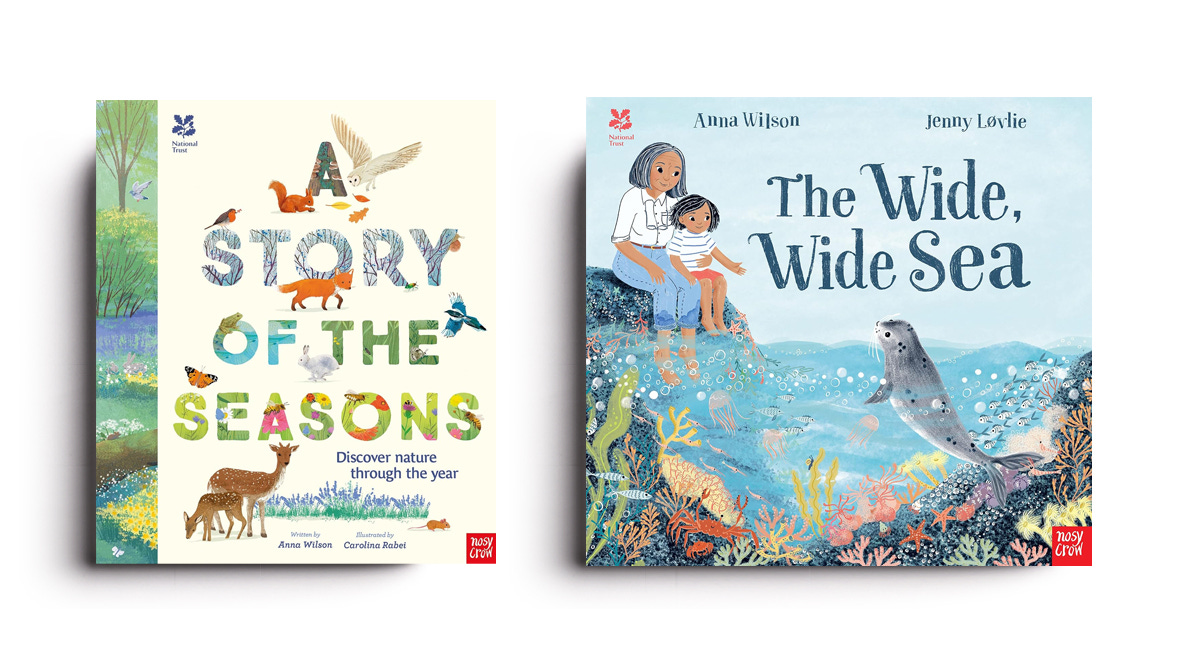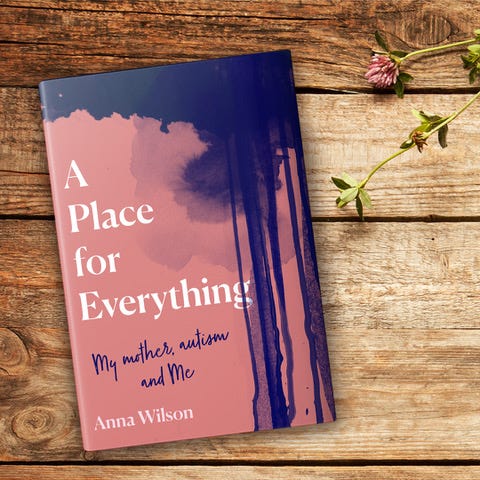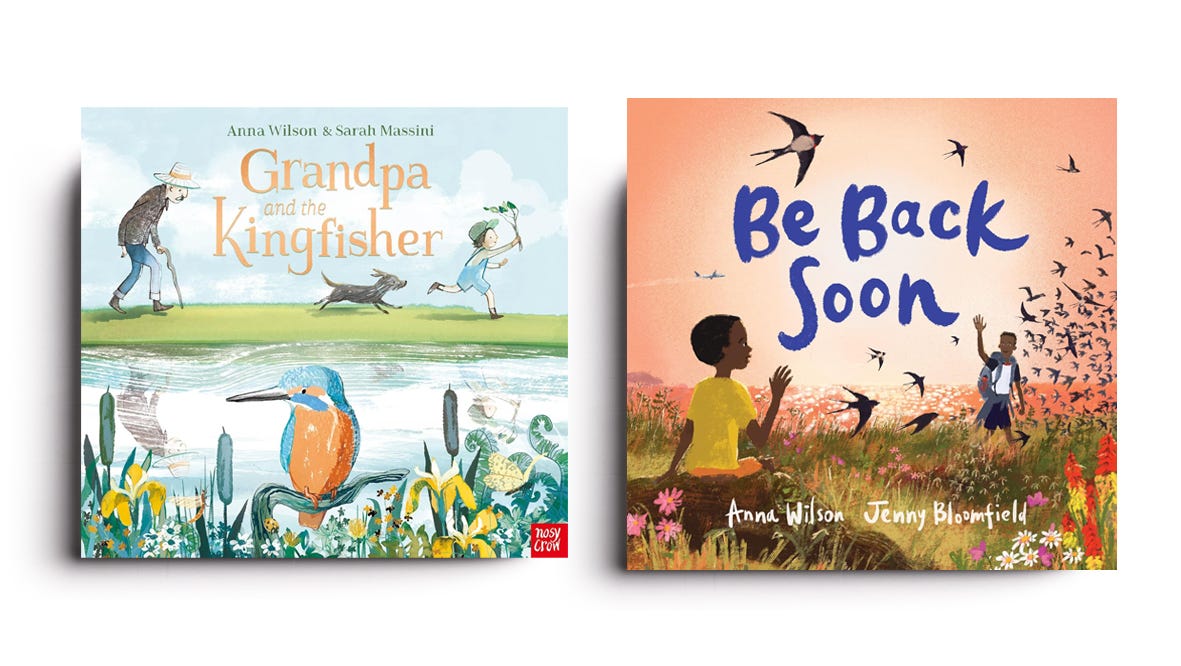Words and Pictures with Anna Wilson
Why you need to be fierce to get published, how the industry has changed and why it's always good to check in with other writers
This week we’re joined by fellow Cornwall based writer Anna Wilson. Anna began her career as an editor before becoming an author. She’s now had over 50 children’s books published and has written novels, non-fiction books, poems, short stories, picture books and early readers.
Her books are often inspired by nature and her latest book - A Story of the Seasons: Discover Nature Through the Year is absolutely beautiful.
Anna has also written an adult non-fiction memoir A Place for Everything: My Mother, Autism and Me about her mother’s late diagnosis of autism at 72. It is an incredibly moving and powerful read.
As well as being a prolific writer, Anna is also a mentor and tutor who helps other writers with their work. She has worked with The London Writers' Salon, the London Lit Lab, and the Arvon Foundation and is also a Royal Literary Fund Fellow.
With Anna’s background as an editor, author and mentor, we couldn’t wait to find out more about her writing journey, see what tips she had for aspiring authors and learn how the industry has changed during her time within it.
Why are words and pictures important to you?
I love the way words and pictures dance together in picture books. You can’t ever say one medium is more important than the other, so when I write I am always trying to leave space for the illustrator’s interpretation.
A good illustrator (and all mine are – I can say that because I don’t choose them, the publisher does) seems to be able to read my mind so that I am always blown away by their depictions of what is in my mind’s eye when I write.
And then when I read the books to children, they come to the books on an entirely different level again and notice things in the text and the pictures that I did not notice! It’s really like magic, seeing a picture book come together when it started as only a few words in my mind.
How did you go from having an idea for a story to getting your first book published?
My first book was an idea commissioned by the publisher I was working for at the time – Macmillan Children’s Books. My boss Kate Wilson, now the Head Honcho at Nosy Crow, asked me to write an African savannah version of “Over in the Meadow”, the well-known children’s counting rhyme.
I turned the idea into “Over in the Grasslands” as I had been lucky enough to go to Tanzania the year before, so I was able to draw on my experiences of going on safari. So really I’m not the best person to ask about how to get a picture book published as I kind of came in through the back door!
That book’s copyright remained with Macmillan, but it did help me get an agent for my next book, “It’s a Bear’s Life”.
Can you share something that might surprise readers about how the publishing industry works?
It’s harder than you think to get published! This is still true for me now, even after over twenty-five years of being published. Every time I pitch a book I feel as though I am starting again. There are a lot of books out there and a lot of people wanting to get published, so the competition is fierce.
So you have to be fierce too – be really persistent, don’t give up, and get ready to face rejection time and again.
You also have to be ready to “shape-shift” – so I started out writing picture books, moved on to young fiction, then middle-grade, then teen… then back to picture books again via non-fiction and a memoir for adults with a few poems along the way!
You can’t sit on your laurels, even if you get an amazing first deal (which I didn’t – haha!) There’s only a certain amount of room in the market for the Julia Donaldsons, Jacqueline Wilsons, J K Rowlings, etc. The rest of us are fighting to keep people noticing us.
You write books for both children and adults - is the experience similar or completely different?
I found it completely different. For a start I had only a few pages of notes from my adult editor. Most of the “editing” was done through long, long conversations about how I could bring out certain themes or characters.
I rewrote the book a couple of times on the basis of these conversations – that was it! But those meetings were pretty intense. It was a bit like being back at uni going to three-hour long supervisions!
My children’s book editors are much more likely to give comments at a line-edit level and thus be more invested in every single word. This is particularly important with picture books because we are still editing the text right up until the book goes to proof because of the way the design and illustrations can change the pace of the book.
This doesn’t mean that words don’t count at the same level of detail in adult books. I am line-editing my novel at the moment and reading it aloud as I do so to check that I have chosen the strongest verb, cut out clichés, made sure I have not repeated myself, etc.
You've had over 50 books published by a variety of different publishers. Do all of them work in the same way or has the experience been different at different publishing houses?
Very different depending on the house and the editors. Some are more hands-on than others. All care deeply about the finished product though, so even if I get a bit frustrated, I remind myself that they need the book to sell every bit as much as I do.
Has publishing changed significantly since your first book was published and if so, in what way?
Writing for children has become a much more collaborative process over the years I’ve been in the industry. When I was an editor, the line edits didn’t really happen until copy-edit stage.
Now I seem to have to go through multiple, micro-managed editing stages before a publisher is happy. Sometimes I have to do this with my agent before she will consider submitting something. I never did this kind of work with my previous agent (who has now retired).
Did you always want to be an author?
Definitely. I wrote my first “book” when I was 13 (a rip-off of an Agatha Christie novel!) and was writing poems and stories in notebooks for years before that. I didn’t have the confidence to think of myself as a writer though. Not until I had my first picture book published when I was 29.
Is writing your full-time job? Has it always been your full-time job or have you done any other work alongside it?
Not any more, sadly. It just doesn’t pay. I had a brief spell of being able to go full-time but then I lost my editor and the publisher had a change of staff and my books fell out of favour.
I had to move publisher and since then writers have been earning less across the board (unless they are already famous… but I don’t want to moan about that!)
I teach more hours than I write now. Which upsets me. And drains me. But I have to pay bills like everyone else. And some of my teaching jobs are fun and very worthwhile - such as working for the Arvon Foundation, London Writers’ Salon and the Royal Literary Fund.
Do you have a writing routine? If so, can you tell us about it?
Not so much these days because of the teaching. I used to drop the kids at school, go for a run and then write from 10am until 3pm every week day. Now I am lucky if I get an hour in the morning and another in the afternoon.
If I need to really focus I try to organise teaching jobs around writing so that I can have a week here or there to concentrate. But I try to write something every day, even if it’s only stream-of-consciousness “morning pages” in my journal.
What do you do to creatively recharge?
I swim in the sea all year round, walk my dog, sometimes run… (Less often than I’d like as I’m getting older and creakier!)
I play the piano, go to the cinema, art galleries, read a LOT, watch TV for an hour a night – and try to make that “good” TV with good plot structure, character development and dialogue as then it’s all learning!
I also meet with other writers when I can to talk about writing. And I check in and out with a writing buddy almost every day to keep me on track.
What are the best bits and the hardest bits of creating children's books?
The best bit is getting the deal! I am always so tingly with excitement when I get a publisher expressing interest in my writing. I almost lose interest when the book comes out as by then I’m already on to my next idea.
The hardest bit is keeping the faith when it seems like no one wants your work any more, and hoping that the next idea will be the one that lights someone’s fire…and sells!
Can you tell us what you're working on now?
I am line-editing my first novel for adults. I’ve been working on it for four years in between other things. It’s a historical romance set in Cornwall. I have an agent for it, but no publisher. Yet. (Ever the optimist!) I also have a couple of picture books brewing in my head.
What advice would you give someone who wants to write their own children's book?
Read, read, read and then read some more. You can’t write for children unless you know what children are reading. Don’t think they’ll want to read what you read as a child. Knowing the market is essential.
Then, just do it! Sit down and write it until it is finished and try not to talk to anyone about your idea until you are well into it and completely wedded to it. Too many people say, “I’ve always thought I should write a book.” These are the people who never do.
You can find out more about Anna on her website here. Follow her on instagram here and on Bluesky here.
Why subscribe to Words and Pictures?
We’ll share everything we know about making books and how the industry works in a new post each Monday.
Every month we’ll hold a live session for community members to ask us anything and everything they want to know about writing, illustrating and getting published.
There will also be free interviews every Friday with authors, illustrators and publishing professionals as they spill the ink about life behind the scenes making books.
Every month we’ll also highlight submission opportunities and exciting new releases in the world of children’s books.
It costs just £5 a month or £50 a year to become a paid subscriber and read all our posts. Our next live chat is this Sunday 22nd December at 8pm and the link to join us this weekend is here.











Another great interview. So much of this resonated with me - especially the bit about nowadays having to go through many rounds of edits before a publisher is happy (which in my recent experience, happens before they’re willing to take a text to acquisitions)!
Yes! Thanks for this great post guys, and your honesty Anna. It exactly reflects my experience in the industry and that change has been rapid and weirdly silent (but slightly deadly!). I love collaboration, so I used to gain a lot when I could work on a general seed of an idea with a publisher until we'd formed something more polished. It is so much less useful if you haven't yet signed a contract at that point. The relationship is terribly uneven when at any point your idea can get dropped with nothing to show for it. Not only do you lose time and confidence, but you're also giving away intellectual property for free.